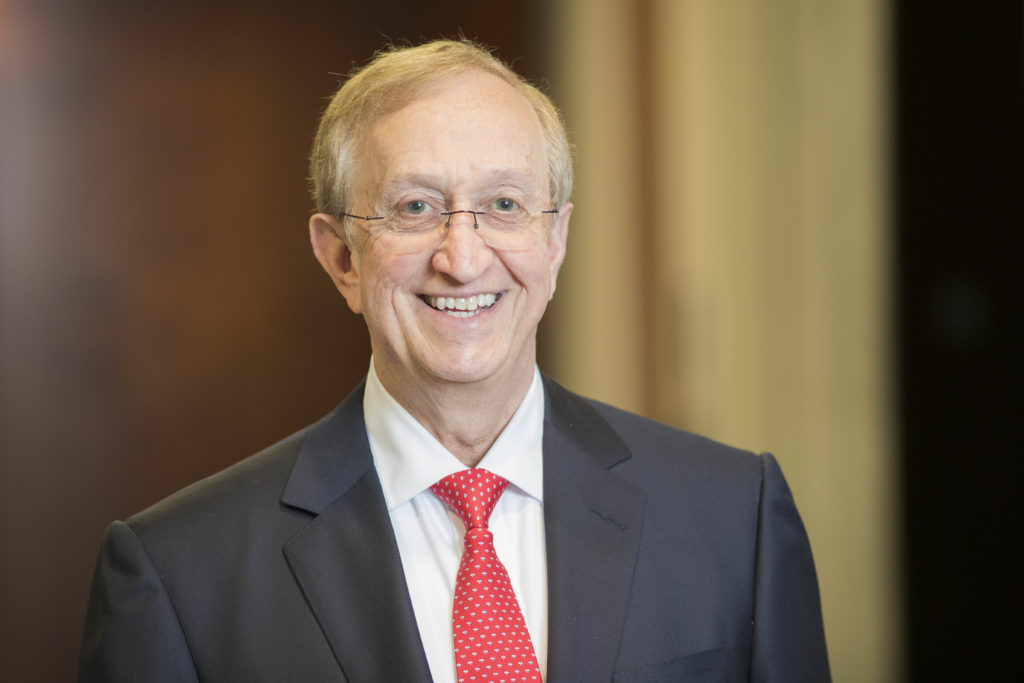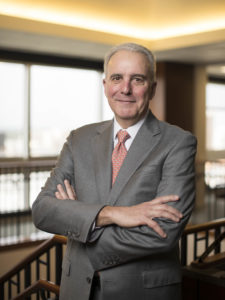When Apache general counsel Anthony Lannie was six, his great uncle drove up to Lannie’s hometown of Hayti, Missouri, for a visit.
“He was a Texas lawyer and he had a big white hat, big cowboy boots and a big car,” Lannie said. “He was the only person in the family that had extra money to throw around, so I thought that might be a good occupation to go into.”
When Lannie was a little older, he used to spend time off from working in his father’s grocery store to watch attorney Jim Ed Reeves try cases in Caruthersville, the county seat. Reeves even helped Lannie with his first case when he was president of his high school’s student body.

The school had a new assistant principal who’d use a four-inch ruler to make sure sideburns weren’t too long and skirts weren’t too short. So Lannie went over to Reeves’ office to see if there was any way to bring a lawsuit to curtail the assistant principal’s enforcement actions, but Reeves didn’t know of any.
“I later got a letter from him with a newspaper clipping from St. Louis with a case on point,” Lannie said. “I sent a letter to the school board with the article attached to it, and the dress code was then turned over to the student body.”
Those two early tastes of lawyering success clearly made an impression on Lannie, who has had a few more legal successes since. The most recent: Apache’s creation of Altus Midstream with special purpose acquisition company Kayne Anderson Acquisition Corp. Lannie – along with his outside counsel, Bracewell partner Alan Rafte – was named a finalist for the M&A Deal of the Year Award by the Houston chapter of the Association for Corporate Counsel.
Birthing a new energy midstream company may sound simple, but this one wasn’t.
Apache originally wanted to sell the midstream assets it had built up around its Alpine High prospect in West Texas’ Delaware Basin. The company opened a data room, and one of the bidders was Kevin McCarthy at Kayne Anderson Fund Advisors.
The two sides ended up agreeing to set up a joint venture to hold the assets, with Apache owning 78 percent and Kayne Anderson Acquisition Corp. holding 22 percent.
That was the easy part.

Apache also wanted to contribute options to acquire equity in several long-haul pipelines in the works by Kinder Morgan, Enterprise Products Partners and others that would reach from the Permian to the Texas Gulf Coast. So much of the joint venture hinged on Apache’s ability to negotiate those long-term options and transportation agreements, which added multiple layers to the transaction’s complexity.
“There were a lot of moving pieces, with eight different transactions, eight closings and five equity options that we were acquiring as part of launching Altus Midstream in addition to the assets Apache had built and was trying to monetize,” Lannie said. “We acquired all of these options and exercised them, which were valued as part of the transaction.”
Shareholders of Kayne Anderson’s SPAC also had to approve the transaction; there was private equity on top of public equity to fund the deal; and debt on top of that. Rafte said the process took nine months with 75 different Bracewell lawyers touching the file.
“There are only half a dozen firms in Houston that can man a project of that size, and I needed one outside firm on all of it, as one piece related to the others,” Lannie said. “I didn’t have enough staff to manage that. We have 20 lawyers total and four of us worked on this transaction almost nonstop.”
Lannie said his team was “at the table” in a negotiating role while Rafte’s team did the “hard punching” on drafting of the documents and research. “We didn’t want to get retraded, as we’d seen with other deals,” Lannie said, referring to a transaction being renegotiated when commodity prices change. “So we relied on Bracewell for heavy lifting on the research and knowledge of other transactions.”
There was a time element to the deal, but Lannie said it didn’t ever seem like a gun was pointed at his head working with Rafte. “He knows what I expect and I hire him in terms of what he knows I expect,” he said. “I get incredible response and immediate overnight turns. It makes it go as fast as humanly possible.”
Rafte was born in Washington, D.C., and grew up in Rockville, Maryland. Both of his parents worked for the Federal Power Commission on the administrative side; his father never graduated from high school and his mother had a degree from a two-year college.
“I was a very dutiful son,” Rafte said. “At the age of 6 or 7, my father said, ‘You’re going to go to law school and become a lawyer,’ and so I did.”
Rafte said his most impactful moment professionally was arriving at then-Bracewell & Patterson under the tutelage of partner Richard Royds after graduating from Emory Law School in 1979. At the time, the energy- and financial services-focused firm was beginning to handle more transactional and finance matters and was expanding statewide and nationally.
“It was an eye-opening experience with good opportunities and good mentors,” he said.
Lannie’s mentor was Larry Stuart, who was the partner-in-charge of then-Johnson & Swanson in Dallas.
“He basically thought of the practice of law as a service business, to help your client achieve business objectives on their timetable,” Lannie said. “That made a huge difference in the way I’ve pursued my practice and what I expect from my outside counsel.”
When Stuart left to join the newly created Dallas office of Weil Gotshal & Manges, he tried to recruit Lannie, who instead accepted a position as general counsel of Baroid Corp., which was being run by Lanny Martin, a friend from Kirkland & Ellis.
The two bought and sold assets to improve Baroid, which was sold in 1994 to Dresser Industries (which is now part of Halliburton). Lannie went on to work as general counsel at Tejas Gas and its affiliate Coral Energy, which was purchased by Shell Oil in 1998 for $1.45 billion. After that, he served as president of Kinder Morgan Power Co. and joined Apache as general counsel in 2003.
The most impactful matter the two have been involved with was when Apache bought $7 billion worth of assets from BP, which had to raise $25 billion in cash quickly to pay for the oil spill at the Deepwater Horizon rig in the Macondo prospect in the Gulf of Mexico.
“They went to two companies they knew could raise that kind of money – us and Occidental – and offered us the package of assets,” Lannie said.
Lannie said BP originally wanted to sell Apache its interests in Alaska, which it declined. But it did manage to pick up three properties it wanted: One in the Permian, one in Canada and one in Egypt.
“They came to us and said, ‘We have to have $5 billion of the $7 billion purchase price in 30 days,’ and it took us almost that long to document those three transactions,” he said. “We funded the $5 billion upfront on the day we signed the contract. The closing was almost an afterthought.”
Added Rafte: “We went through a public debt offering and a public equity offering, which was one of the largest in the last decade.”
At the same time, Lannie was handling a major piece of litigation involving Concho Resources, which announced it was buying into the other half of BP’s Permian assets.
“When I took the idea to the CEO, I thought he would choke: We’re going to exercise preferential rights without seeing Concho’s deal,” he said. “We figured that whatever Concho was willing to pay, we were willing to pay. We ended up with BP’s interest plus half or a third from Concho and the right to operate. That was huge for us on the litigation front.”
Added Rafte: “That was an intense 30-day period.”
Lannie said that Apache has bought $17.5 billion in assets and sold $18 billion in assets over the years, often with Rafte and his team at his side. “It’s been one major transaction after another,” he said.
In the end, Lannie said the Altus transaction worked out exactly the way it should have, a testament to his partnership with Rafte, who, interestingly, shares the same birth date.
“When we did the transaction, we wanted to stay in the equity, as it wasn’t the optimal time to sell the system,” Lannie said. “We ended up with an entity that gives Apache an ongoing interest in what we think is a prime, very valuable asset.”
